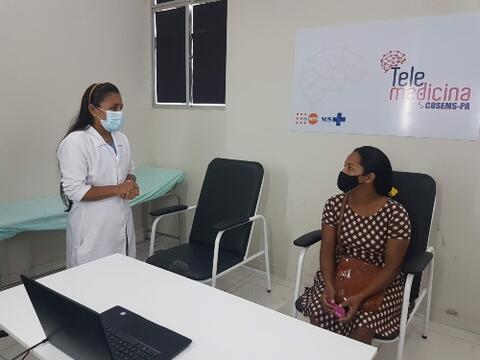News
A pandemic-born programme bolsters local health systems in Brazil
- 15 February 2021
News
MARAJÓ ARCHIPELAGO, Brazil – The boat to Santa Cruz do Arari leaves Belém, the capital of Pará state in northern Brazil, at 6 a.m. every day. It is November – dry season – so the river is low, and the boat carrying the UNFPA team can only go as far as the port of Jenipapo, where they drive the rest of the way via dirt road to reach their destination by 2 p.m.
The team is here to visit three municipalities in the Marajó archipelago that are taking part in the Saúde das Manas (“Sisters’ Health”) project, a partnership between UNFPA and the Council of Municipal Health Departments of Pará (Cosems/PA). Its aim is to strengthen the quality of reproductive health care the local health system provides in COVID-19 times by setting up telemedicine offices at seven health-care clinics (called basic health units in Brazil), which will provide online consultations with specialists in gynaecology and obstetrics. With the opening of five locations on 12 February, the programme now serves 80,000 women of reproductive age in Santa Cruz do Arari, Afuá, Anajás, Bagre, Breves, Melgaço and Salvaterra.
Easing access to health care
Santa Cruz’s Joint Health Unit has one general practitioner. Before the telemedicine office opened here, patients who required a more specialized consultation had to go to Belém, more than 100 kilometres away, mostly by boat. Other municipalities are more than 24 hours away. Now, women are able to consult with a gynaecologist or obstetrician remotely.
Currently, nurses provide antenatal care to patients like Lindaura Gemaque, 46, who received antenatal services here but chose to give birth to both of her children in the capital so she could see a specialist. Ms. Gemaque, a teacher and guidance counsellor, says Saúde das Manas will also help stem rising rates of teenage pregnancy. “Many parents do not talk to their children, who learn from their peers and end up getting pregnant too early,” she said. “That is why it is important to have these [remote] consultations, so that the girls will learn how to take care of themselves.”

Cervical cancer prevention
The taboo that surrounds talking about reproductive health care, coupled with the lack of resources, prevents many women from seeking help, according to nurse Keithian Maia. She works with six community health agents who check in on patients at their homes and deliver medicines and contraceptives via bicycles provided by the programme. “In October, we ran a campaign to perform preventive exams. We have seen a lot of deaths of women due to cervical cancer,” Ms. Maia explained. “The project is going to be very good because we don’t have a gynaecologist here, and many women stop going to Belém for consultations out of shame or [because] not all of them have the money to pay for the ticket or a place to stay in Belém.”
Next on the itinerary is Salvaterra, a five-hour boat ride and two-hour van ride away. According to the Brazilian Institute of Geography and Statistics (IBGE), the city has a population of just over 24,000, 15 health units, 20 hospital beds and no specialist doctors. The telemedicine office is installed at Municipal Hospital Dr. Almir Gabriel, where Joélia Silva, 42, was scheduling a virtual appointment. “I have had the results of my preventive exam since 2018, but there haven’t been any doctors to evaluate it,” said Ms. Silva, who lost her grandmother and great-grandmother to cervical cancer. “As I’ve had cases of death in the family due to cervical cancer, I rushed to schedule my appointment.”
Because of the success of the other clinics, Cosems/PA is expanding the project to other municipalities, including Soure, half an hour away from Salvaterra via ferry and the last stop on this visit. Specialized health care for the population has long been the dream of Soure’s health secretary, Maria Helena Gomes. And now the dream has come to fruition at Família da Matinha Health Unit, which houses the telemedicine office. “It is very important to have this telemedicine service for the population who find it difficult to get to the state capital and for doctors who have difficulty getting here,” Ms. Gomes said. “The partnership will improve the health of the municipality.”